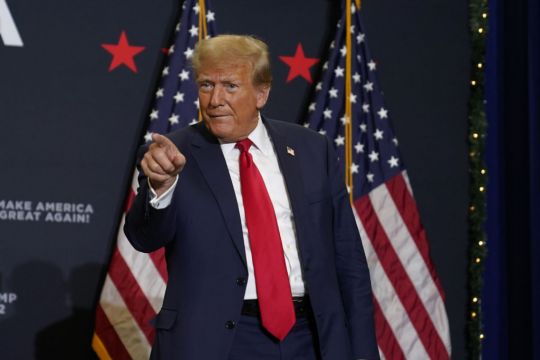Donald Trump plans to be in a Washington courtroom on Tuesday as his lawyers argue that the former US president should be immune from charges that he illegally sought to overturn the results of the 2020 election.
His visit is likely to serve as a campaign stop, with the courthouse serving as a backdrop.
Mr Trump will not get a chance to speak in court as his lawyers try to convince three federal appeals-court judges that the case should be dismissed before it goes to trial in March.
But with the Republican state-by-state presidential nominating contest due to kick off next week, Mr Trump may get a chance to tell television cameras outside the courthouse that he is the victim of political persecution.
That argument has resonated with Republican voters.
Mr Trump has opened up a commanding lead over his rivals for the party's presidential nomination since the first criminal charge against him was announced last March, and he is expected to easily win Monday's contest in Iowa.
Inside the courtroom, Mr Trump's lawyers will tell a three-judge panel of the US Court of Appeals for the District of Columbia Circuit that the case should be dismissed on the grounds that former presidents cannot be held criminally liable for carrying out their official duties.
Allowing former presidents to be prosecuted, they have argued, would “launch cycles of recrimination and politically motivated prosecution".
Special counsel Jack Smith, who is overseeing the prosecution, has argued that granting such a sweeping legal shield would give future presidents licence to commit crimes such as accepting bribes or directing the FBI to plant evidence on political opponents.
Mr Smith has argued Mr Trump was acting as a candidate, not a president, when he pressured officials to overturn the election results and encouraged his supporters to march to the Capitol on January 6th, 2021.
Both the legal outcome and timing of the appeals court’s ruling will play a pivotal role in determining whether Mr Trump faces trial ahead of the November 5th, 2024, election.
Mr Smith has accused Mr Trump of a multi-pronged conspiracy to hinder the counting and certification of his 2020 defeat, culminating in the January 6th attack. Mr Trump has pleaded not guilty to charges including defrauding the government and obstructing Congress.
The case is one of four criminal prosecutions Mr Trump faces this year as he campaigns to win back the White House.
Mr Trump's immunity claim has already been rejected by US District Judge Tanya Chutkan, who is overseeing the case. But it could take several weeks or months to be resolved on appeal.
Any ruling from the appeals court is almost certain to be appealed to the US Supreme Court, which last month denied a request from Mr Smith to immediately decide the issue.
Activity in the case has been halted in the meantime, which could delay the trial's scheduled March 4th start.







